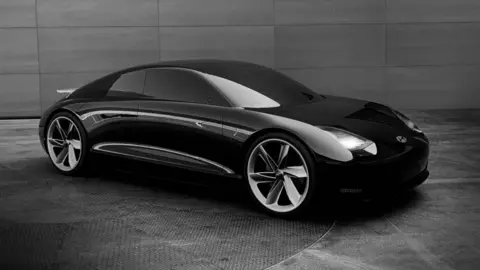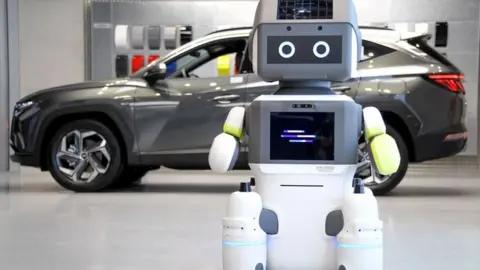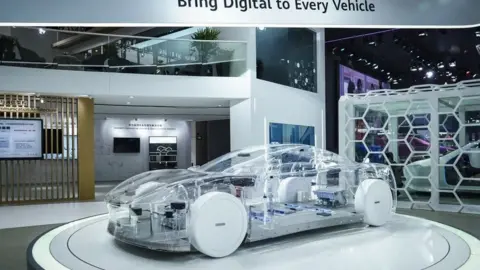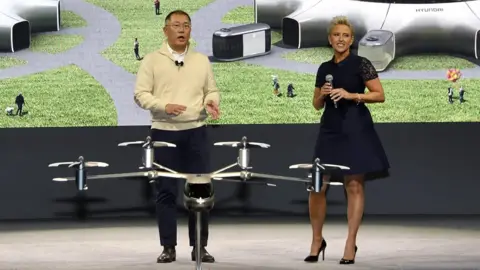Hyundai: The carmaker aiming to become a tech firm
 Hyundai
HyundaiFor a few weeks this year, South Korean carmaker Hyundai was dusted with the Apple magic.
Last month Hyundai let slip that it was in talks with the maker of the iPhone to co-operate on a car project, but this week it said the talks were over.
However, this is by no means the end of Hyundai's push into technology.
The car firm has been investing heavily in new technology with a string of partnerships, acquisitions and investments within the tech space.
Its takeover of robotics firm Boston Dynamics last year was a clear indication of the direction it is taking - into cutting-edge technology.
The whole auto industry has been forced to innovate as the move towards electric cars and autonomous vehicles accelerates.
Hyundai has been criticised in the past for lagging behind rivals in adopting emerging technologies but is fast catching up, sealing a string of alliances and investments with technology groups recently.
"Hyundai has a different set of motivations and more incentive to push the limit. They have been a lot more aggressive in reinventing themselves," says Dale Hardcastle, a partner at consultancy firm Bain.
 Hyundai
HyundaiHyundai has been ramping up the electrification of its line-up of cars with a dedicated battery electric vehicle (BEV) range called Ioniq.
Its aggressive electric car ambitions will see it launch 12 new BEV models over the next four years, and fully electrify its line-up around the globe by 2040.
Beyond battery electric vehicles, Hyundai has been busy developing charging points and hydrogen refuelling stations.
"It's very clear where Hyundai sees its future. It's a brand that wants to disrupt and push forward, to break up the status quo," says Mr Hardcastle.


The purchase of a majority stake in Boston Dynamics in a $1.1bn (£810m) deal in December was seen as a major step to becoming a leader in car technology.
Boston Dynamics is a pioneer in consumer robotics, while it has a shared interest with Hyundai in autonomous driving and smart factories.
"Hyundai is being very responsive to the dynamic market trends," says Bakar Sadik Agwan, senior automotive consulting analyst at GlobalData.
"With the automotive industry getting more dynamic day by day due to the fast technological advancements, companies need to transform their business strategies to secure their position in the future mobility era. Hyundai seems to be well on track in this direction."
 Huawei
HuaweiThe fact that Apple was considering a partnership with Hyundai shows how far the carmaker has advanced.
And there are plenty of other projects in the pipeline.
Electric vehicles, autonomous driving and even the potential for passenger drones are all possible projects for Hyundai and its sister company Kia.
"We are receiving requests for co-operation in joint development of autonomous electric vehicles from various companies, but they are at an early stage and nothing has been decided," Hyundai said.
"The stock market loves car companies who are tech firms, as seen with Tesla's rise," says Sarwant Singh, managing partner at analysts Frost & Sullivan.
"This partnership [with Apple] would have further highlighted Hyundai's position as a tech innovator."
Many industry experts expect Hyundai to tie up with fellow South Korean conglomerate and tech giant Samsung in developing smart electric vehicles.
"Hyundai Motor Group is exploring areas of potential collaboration with diverse business partners around the world including Samsung Group, but there is no specific initiative we can identify at this time," Hyundai spokeswoman Jin Cha told the BBC.
"In line with this, we have our doors open to potential partners, particularly global companies which are global leaders in their respective domains."
Modern touch
Hyundai, which means modernity in English, was founded by Chung Ju-yung in 1947. The group makes products across the motor, construction, steel and technology industries.
Mr Chung handed over the reins in 2000 to his son Chung Mong-koo who ran the company for 20 years before moving on to become honorary chairman last October.
He was succeeded by his son Euisun Chung in a move many feel will give impetus to the world's fifth largest carmaker's push into electric vehicles.
In a welcome speech Mr Chung, 49, said he hoped to bring about change at Hyundai during a period of rapid technological innovation within the global auto industry.
He identified autonomous driving, electrification, hydrogen fuel cells, robotics and urban air mobility (UAM) - industry jargon for flying cars - as his future initiatives.
"Carmakers need to prepare themselves for the future. By not exploring potential new business models, these companies are setting themselves up for obsolescence," says Sam Fiorani from AutoForecast Solutions.
Future focused
The changes began just over a year ago when Hyundai signed a joint venture with self-driving technology firm Aptiv in a $4bn partnership named Motional.
Ireland-based Aptiv supplies the technology that helps integrate data coming from the sensors that self-driving cars rely on.
"Automobile manufacturers need to become technology companies. The old model of just making and selling cars and trucks is disappearing and the future is so much more," adds Sarwant Singh at Frost & Sullivan.
Hyundai also has an ambitious plan to build electric air taxis and wants to get them flying by 2028.
 Getty Images
Getty ImagesTech titans
A recent report by Boston Consulting Group (BCG) looked at the prospects of tech companies like Apple and Google becoming significant carmakers in the future given their recent advances.
Tech giant Google has its own self-driving unit called Waymo, which already makes commercial self-driving taxis, while it emerged in December that Huawei is working on its own smart car.
But BCG concluded that the reverse could happen instead.
"The automakers that digitally reinvent the fastest, becoming a company that looks more like Apple or Peloton.
"It could be argued that such automakers would have the scale to add themselves to the list of future tech giants."
Hyundai is hoping to be one of them.
